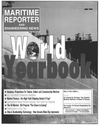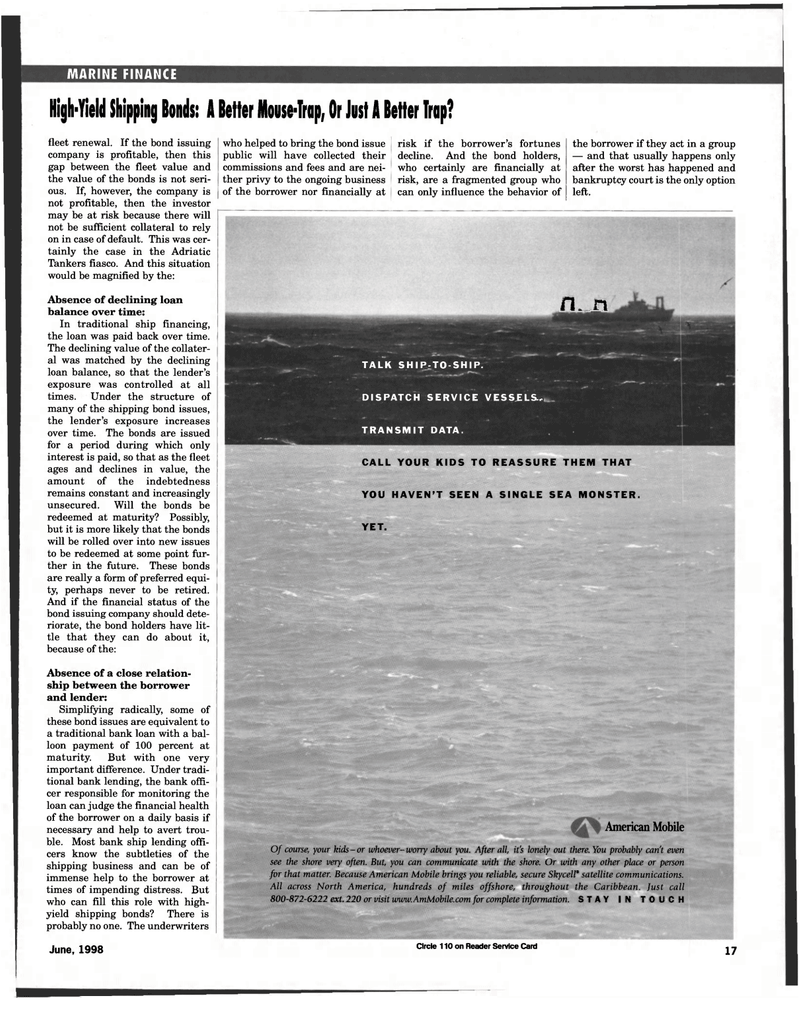
Page 17: of Maritime Reporter Magazine (June 1998)
Read this page in Pdf, Flash or Html5 edition of June 1998 Maritime Reporter Magazine
MARINE FINANCE
High-Yield Shipping Bonds: A Better Mouse-Trap, Or Just A Better Trap? fleet renewal. If the bond issuing company is profitable, then this gap between the fleet value and the value of the bonds is not seri- ous. If, however, the company is not profitable, then the investor may be at risk because there will not be sufficient collateral to rely on in case of default. This was cer- tainly the case in the Adriatic
Tankers fiasco. And this situation would be magnified by the:
Absence of declining loan balance over time:
In traditional ship financing, the loan was paid back over time.
The declining value of the collater- al was matched by the declining loan balance, so that the lender's exposure was controlled at all times. Under the structure of many of the shipping bond issues, the lender's exposure increases over time. The bonds are issued for a period during which only interest is paid, so that as the fleet ages and declines in value, the amount of the indebtedness remains constant and increasingly unsecured. Will the bonds be redeemed at maturity? Possibly, but it is more likely that the bonds will be rolled over into new issues to be redeemed at some point fur- ther in the future. These bonds are really a form of preferred equi- ty, perhaps never to be retired.
And if the financial status of the bond issuing company should dete- riorate, the bond holders have lit- tle that they can do about it, because of the:
Absence of a close relation- ship between the borrower and lender:
Simplifying radically, some of these bond issues are equivalent to a traditional bank loan with a bal- loon payment of 100 percent at maturity. But with one very important difference. Under tradi- tional bank lending, the bank offi- cer responsible for monitoring the loan can judge the financial health of the borrower on a daily basis if necessary and help to avert trou- ble. Most bank ship lending offi- cers know the subtleties of the shipping business and can be of immense help to the borrower at times of impending distress. But who can fill this role with high- yield shipping bonds? There is probably no one. The underwriters who helped to bring the bond issue public will have collected their commissions and fees and are nei- ther privy to the ongoing business of the borrower nor financially at risk if the borrower's fortunes decline. And the bond holders, who certainly are financially at risk, are a fragmented group who can only influence the behavior of the borrower if they act in a group — and that usually happens only after the worst has happened and bankruptcy court is the only option left. fh Tl
TALK SHIP-TO-SHIP.
DISPATCH SERVICE VESSJEL&,
TRANSMIT DATA.
CALL YOUR KIDS TO REASSURE THEM THAT
YOU HAVEN'T SEEN A SINGLE SEA MONSTER.
YET.
American Mobile
Of course, your kids-or whoever-worry about you. After all, it's lonely out there. You probably can't even see the shore very often. But, you can communicate with the shore. Or with any other place or person for that matter. Because American Mobile brings you reliable, secure SkycelT satellite communications.
All across North America, hundreds of miles offshore, throughout the Caribbean. Just call 800-872-6222 ext. 220 or visit wunv.AmMobile.com for complete information. STAY IN TOUCH
June, 1998 Circle 110 on Reader Service Card 17

 16
16

 18
18
